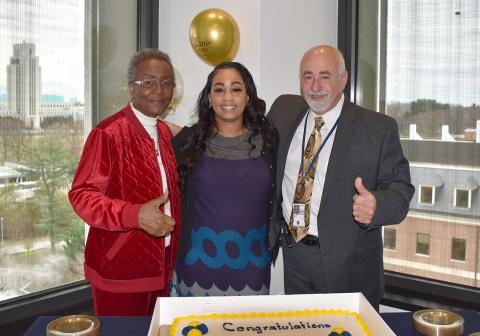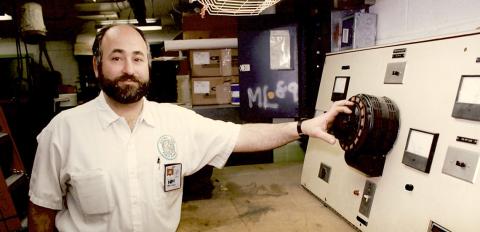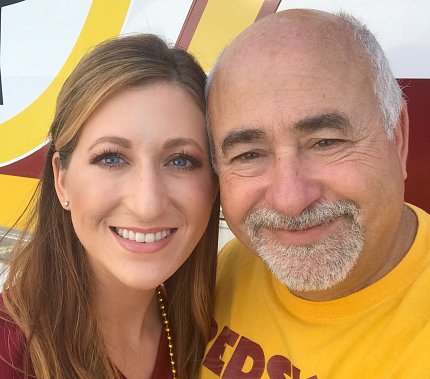A Glowing Career
DPSAC Access Control Chief Retires After 42 Years

Late at night on Nov. 27, when a small plane got entangled in power lines in Gaithersburg causing widespread power outages, Alex Salah was immediately notified by some of his customers that they lost power and went to their homes to connect their generators. The much sought-after electrician gets called for all kinds of electrical work across the Washington, D.C. area. He also has been a longtime asset at NIH, where he recently retired after 42 years of federal service.
Salah first came to NIH in 1977 on a part-time job in the fund management and cost analysis section of the Office of the Director’s Division of Financial Management. He had seen an ad for the job in the student newspaper at Montgomery College, where he was majoring in computer science and accounting. Three years later, he officially became a federal employee.
One day, a colleague was talking excitedly about his apprenticeship as a maintenance mechanic with NIH’s Division of Engineering Services (DES), which is now the Office of Research Facilities (ORF). That sparked Salah’s interest and got the wheels turning.
“My dad used to say, ‘I don’t care how much college education you have; you should learn a trade,’” said Salah.

In 1983, Salah began a 4-year electrical apprenticeship at NIH, studying electrical engineering at Montgomery College to become an electrician while getting on-the-job training in DES.
Salah graduated top of his class in 1987. Two years later, NIH promoted him to electrician leader. A year after that, he became assistant chief of the electrical department.
“From the moment I met Alex, I knew he would move up the ladder and excel, which he did,” said John Hollingsworth, a retired NIH project officer who was Salah’s supervisor at that time. “He became one of the best electricians in that shop.”
When ORF created the automated systems unit to oversee elevators, fire alarms, generators and badge access, Salah became its first chief.
While in charge of fire alarm systems, Salah recalled getting summoned frequently by the fire or police department to work on jobs well into the night. Sometimes he’d finish up at 3 or 4 a.m., bunk at the firehouse for a few hours, then head to his office that morning.
In 2003, NIH Police hired him as a security specialist. For the next two decades, Salah would help keep NIH secure—from security access to safeguarding NIH’ers’ personally identifiable information. One of his major projects was managing electronic security during construction of NIH’s perimeter fence.
There’d be more restructuring and beefed-up security after the Department of Homeland Security was created, including a mandate that established the Division of Personnel Security and Access Control (DPSAC). Salah became chief of its Access Control Branch in 2007.
He and his team have top clearances to do their jobs.
“It’s basically a chain with many links,” Salah said. “If you break one link, everything is broken. Everything has to work together like clockwork—from background investigations to access control to systems being up and running to people having the right credentials, and making sure staff have correct access rights to open certain doors. We all have to play together to make this finely tuned machine work.”
Salah’s fondest memories at NIH came from volunteering. Originally from Amman, Jordan, he arrived in the States at age 13 fluent in Arabic, English and French. His multilingual ability led him to be a translator for patients for nearly 20 years, often with NCI and NHLBI’s bone marrow transplant unit.
“I got to talk to patients firsthand,” he said. “What NIH stood for and could do is amazing. My best memories are getting to know patients and see them get cured and be able to go home.”
During his official duties, there were many adventures.
“I’m always here,” even through furloughs, Salah said. “I’ve been here many, many times when there were electrical explosions or electrical failures.”
One year, Salah got called in on Superbowl Sunday. Bldg. 30 had lost power. He came in to hook up a generator to restore electricity.
“But it doesn’t power up everything in the building and there was a huge concern about the animals,” said Salah, who helped transport them elsewhere to safety. “It felt like I’m part of a very important function, making sure the animals are taken care of and [the outage] didn’t affect research.”

In retirement, Salah hopes to travel and spend more time with family, including his wife of 38 years, Denise, and their daughter Kathleena who—he beamed—wed his best friend’s son, Eyal, in December.
Electrical work remains his passion and, though he’s retiring from NIH, Salah plans to continue working as a master electrician, running the small business he started in 1989. In fact, Salah Electric was voted best local electrician in Washington Jewish Week in 2021 and made the list again in 2022.
“What I remember most about working with Alex,” added Hollingsworth, “is he had a desire to achieve and he worked hard. And, he’s always smiling.”
